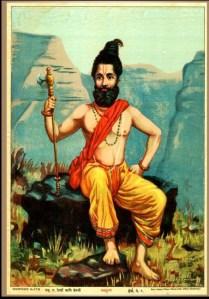
You can also read about Parasurama in the Ramayana by clicking here.
Bhishma, the patriarch of the Kuru dynasty attended the swayamvara conducted by the king of Kasi and proclaimed that he was taking the three princesses of the kingdom as brides for his step-brother Vichitravirya, the king of Hastinapur. He issued an open challenge to all the kings and princes assembled there to engage him in combat if they dared to do so.
Unknown to him or anybody else in the gathering was the fact that the eldest princess Amba was in love with the king Salwa. Before the swayamvara, she had decided that she would choose him as her husband and her desire to become his queen would be fulfilled, before Bhishma showed up at the event to spoil her plans. What was worse was that Salwa was defeated by Bhishma when he tried to prevent the patriarch from taking away the princesses to Hastinapur.
In Hastinapur, when Amba approached Satyavati and Bhishma and informed them of her love for Salwa and that she would want to be married to him, they allowed her to go to him unharmed and also provided an escort as well. However, when she reached the court of king Salwa, he declared that he no longer wished to marry her as he had been fairly defeated by Bhishma and that she belonged to him now. Despite her entreaties to the contrary, the king refused to take her as his wife and queen and sent her away.
Dismayed by this turn of events Amba took refuge in an ashram which was occupied by ascetics. Here, a sage Saikhavatya listened to her tale and offered her his assistance in her quest for justice. He first advised her to return to her father as there were only two true protectors of a woman; a father and a husband. When Amba declined and professed her decision to practice austerities, he advised her to approach Parasurama with her grievances and request him to seek retribution against Bhishma who she blamed for her current situation.
Parasurama after hearing her story and understanding her grievances offered to summon Bhishma and advise him to marry the princess himself as he had forcibly taken her away from her father’s kingdom. He also promised her that in case Bhishma didn’t heed to his words, he would surely engage him in battle. However, Amba was not pleased with this conciliatory approach taken by the great sage and wanted him to slay Bhishma who she held responsible for her plight.
Parasurama then goes to Kurukshetra and approaches Bhishma with Amba’s grievance. When the patriarch refuses to budge from his earlier stand, he then challenges him to engage with him in battle. Seeing no other option available to him, Bhishma agrees to engage in combat with the angry sage. Despite the efforts of Goddess Ganga, Bhishma’s mother to reconcile both men, neither of them budged from their stands and therefore the conflict was inevitable.
Both the formidable warriors then engaged in a battle which lasted for twenty three long days where neither of them had a distinct advantage over the other. Both of them matched each other in valor, skill and courage during this period and did not allow the other to gain an upper hand. Finally, when both of them had lost their patience with the combat, they started using celestial weapons one after the other wreaking havoc on the entire battlefield and the surrounding areas. Disturbed with this sudden serious turn of affairs, Narada and other celestial sages from the heavens appeared before both the combatants, Bhishma and Parasurama and advised them to desist from fighting each other.
Finally heeding to these wise words Parasurama ended the conflict and the battle was declared a draw. Parasurama then went to Amba and addressed her thus – O Amba, as you are well aware I fought Bhishma for twenty three days now and have been unable to defeat him despite my best efforts, power, might and celestial weapons. You have no other option than to seek his protection.
Amba refused to heed to his words and told him that she intended to undertake severe austerities and seek celestial blessings in her quest to extract revenge on Bhishma for the situation she found herself in. She would then go on to conduct a twelve year long penance which resulted in her being given a boon by none other that Shiva himself.
You can also read about Parasurama in the Ramayana by clicking here.
